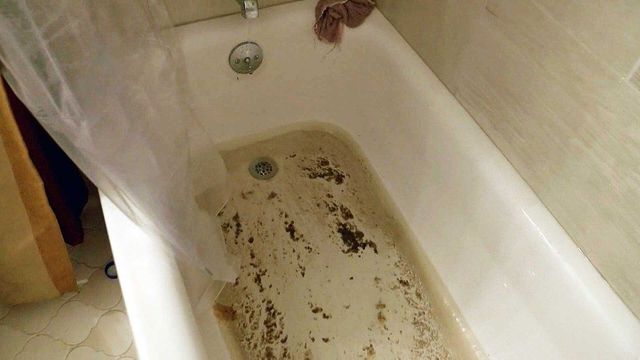Recommended Reasons for Waste Coming Up in the Bathtub
DetailsThe author is making a few good points related to Why is There Sewage Coming Up Through the Bathtub in general in the content just below.

Sewer back-up in the tub can be a stressful and unsanitary problem for any kind of homeowner. Not only is it troublesome, yet it likewise poses serious health threats and shows underlying issues with the plumbing system. Understanding why sewer is showing up through the bathtub is vital for taking appropriate activity to deal with the issue properly.
Introduction to the Concern
Comprehending the Problem
When sewage starts backing up into the bath tub, it's a clear sign of an issue with the drainage system. The wastewater that must be moving away from your home is instead finding its back right into your space, which can cause significant damage and health hazards.
Possible Reasons
A number of elements can contribute to sewage backup in the bath tub. From clogs in the sewage system line to concerns with the plumbing framework, recognizing the source is essential for locating a solution.
Typical Reasons for Sewage Backup
Obstructions in the Drain Line
Among the most typical causes of sewage backup is a blockage in the sewer line. This can happen as a result of the buildup of debris, grease, or international objects in the pipelines, stopping proper flow and triggering sewer to support right into your tub.
Tree Root Invasion
Tree roots seeking wetness and nutrients can infiltrate sewer lines through little splits or joints. Gradually, these origins can expand and broaden, causing substantial damages to the pipelines and leading to sewer back-up issues.
Aging Infrastructure
Older homes might have obsoleted plumbing systems that are extra at risk to rust, fractures, and degeneration. As pipes age, they come to be a lot more prone to leaks and clogs, enhancing the chance of sewage backup incidents.
Heavy Rainfall or Flooding
During periods of heavy rainfall or flooding, the sewer system might become overwhelmed with excess water, causing back-ups and overflows. This can result in sewage backing up right into bathtubs and various other components inside the home.
Wellness Risks Associated with Sewage Back-up
Contamination of Water
Sewer backup can pollute the water in your home, posturing a serious health and wellness threat to you and your family. Direct exposure to polluted water can bring about intestinal issues, skin infections, and various other health problems.
Spread of Disease
Sewer contains hazardous microorganisms, viruses, and parasites that can create a range of illness, consisting of liver disease, cholera, and gastroenteritis. Coming into contact with sewer or contaminated surface areas puts you in jeopardy of infection.
Mold Growth
Dampness from sewage back-up can create ideal problems for mold development in your home. Mold spores can exacerbate respiratory issues and cause allergic reactions in sensitive people, making timely cleanup necessary.
Signs of Sewer Backup
Foul Odors
Undesirable smells originating from drains or components, specifically in the shower room, may suggest sewer back-up problems. These smells are frequently strong and consistent, indicating a problem that needs prompt focus.
Slow Draining Fixtures
Bathtubs, sinks, and toilets that drain slowly or otherwise at all could be experiencing sewage back-up. If numerous components are impacted simultaneously, it's most likely that the concern stems from a typical factor, such as the major sewage system line.
Gurgling Noises
Odd gurgling or gurgling noises originating from drains pipes when water is running elsewhere in the house are indicative of air entraped in the plumbing system. This air buildup can arise from sewer back-up and must be checked out quickly.
Immediate Actions to Take
Switching Off Supply Of Water
In the event of sewer backup, it's vital to switch off the supply of water to stop additional contamination and damage. Locate the primary water shutoff valve in your house and closed it off up until the problem can be solved.
Contacting an Expert Plumber
Dealing with sewer back-up is not a do it yourself task. Contact an accredited plumber with experience in handling sewage-related concerns to evaluate the situation and carry out necessary repair work or clean-ups.
Preventing Contact with Infected Water
Up until the sewer back-up is settled, avoid contact with infected water to stop the spread of germs and virus. Put on safety gear if you should remain in the affected location and wash your hands completely afterward.
Safety nets
Regular Maintenance of Drain Lines
Set up regular evaluations and maintenance of your sewer lines to check here recognize and deal with prospective problems before they escalate right into significant problems. This can consist of cleaning particles, inspecting for tree root invasion, and repairing any broken pipes.
Mounting Backwater Shutoffs
Think about installing backwater shutoffs in your plumbing system to avoid sewage from receding right into your home during periods of heavy rainfall or flooding. These valves automatically close when water draws back up, securing your residential or commercial property from contamination.
Proper Disposal of Home Waste
Stay clear of purging anything aside from toilet paper and human waste down the commode to stop blockages and blockages in the drain line. Dispose of grease, oil, and various other family chemicals properly to reduce the danger of plumbing troubles.
Tidying up After Sewage Back-up
Disinfection Procedures
Completely disinfect and sterilize affected locations after sewage backup to remove unsafe bacteria and prevent mold and mildew growth. Usage suitable cleaning products and protective equipment to make certain risk-free and effective cleanup.
Restoration of Affected Areas
Fix any damages to floor covering, wall surfaces, or fixtures caused by sewage backup. Depending on the extent of the damages, you may need to change carpeting, drywall, or other products to recover your home to its pre-loss problem.
Why is There Sewage Coming Up Through read more the Bathtub
Sewage in your bathtub is a major problem that can make you want to abandon the bathroom for good. You don’t have to. However, it is important to identify the source of the issue and take the necessary steps to resolve it in order to avoid any health risks and property damage. In this article, we will discuss what could be causing sewage to back up through your bathtub so you can take action quickly and effectively.
The Main Reason For Sewage Backup in The Bathtub
All the sinks and toilets in your home connect to different pipes that lead to the main sewer line. The sewer line then connects to the municipal sewer system. This connection works seamlessly on a daily basis, but there can sometimes be a problem with the main sewer line.
The most common cause of sewage backup is a clogged or blocked main sewer line. The main sewer line can be clogged due to the accumulation of debris, tree roots or grease buildup, or other materials. Another possible cause is a collapsed pipe. When this happens, your toilets and sinks won’t be able to drain properly. This is when sewage starts backing up through the bathtub. If the problem has been occurring for some time now, it might be time to consult with a plumber as there may be more severe damage that needs fixing.
How Can You Tell if it’s Coming From Your Sewer Line?
If you’re experiencing a sewage backup in your bathtub, then you can use a few simple methods to determine if it is coming from the main sewer line. First, try to unclog the tub drain with a plunger or an auger and see if that helps. If not, then inspect all of the drains in your house and check if there is any blockage in them. If some of the other drains are not working fine, then it’s likely the problem is with your main sewer line.
Common Signs of a Clogged Main Sewer Line
If you suspect that your main sewer line is blocked, then there are a few common signs to look out for. Frequent clogs in your home are a sure sign of a clogged sewer line. You can also check for slow drainage from all the plumbing fixtures.
Slow Drains
If you notice that it takes longer for your sinks and toilets to drain, then this could be a sign of a clogged main sewer line.
Frequent Clogs
Another common sign is that your drains or toilets become clogged almost all of the time. If this happens, then it could be a sign that the main sewer line is blocked.
Water Backup
Do you notice water or sewage coming back up from any of the drains in your home? If your answer is yes, you may have a clogged main sewer line.
Sinkholes
If you’ve noticed sinkholes in your yard or overflowing sewage from the ground, you may be facing a blocked sewer line issue.
Your Shower or Sink Makes Gurgling Noises
Have you noticed gurgling noises coming from your sink or shower lately? These are typically signs of a blocked sewer line and should be checked out immediately.
How to Prevent a Main Sewer Line Clog
Once you’ve identified that your main sewer line is clogged, it’s important to take steps to prevent it from happening again. The best way to do this is to avoid putting any solid material that can clog the drain, such as grease and other debris. You should also be mindful of what you flush down your toilet. In addition, you should schedule regular maintenance for your main sewer line. This will help keep it clear and free from clogs or backups.
What Should You do if You Notice Sewage Backing up Through The Bathtub?
If you’ve noticed sewage backing up through the bathtub, then it is important to call a professional plumber immediately. A plumber can inspect the situation and determine what the cause is, such as a blocked main sewer line. They will also be able to advise you on how best to fix the issue. In some cases, a simple drain cleaning may be all that is needed.
However, if the blockage is severe, then your plumber may need to use more advanced methods to clear the blockage.
No matter what, it is important to always call a professional plumber if you experience any kind of sewage backup. They will be able to assess the situation and provide you with a solution that is best for your home.
https://baylorinc.com/blog/why-is-there-sewage-coming-up-through-the-bathtub/

I have been very intrigued by and I am hoping you enjoyed the blog entry. Feel free to take a moment to share this blog if you appreciated it. Bless you for your time. Please check our site back soon.
Schedule And Pricing